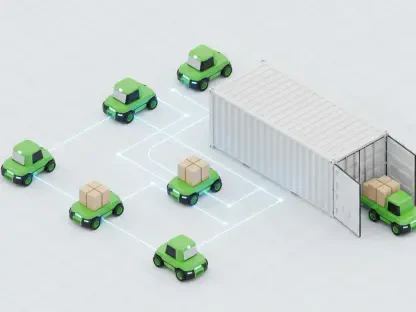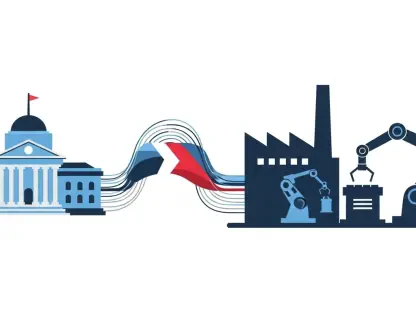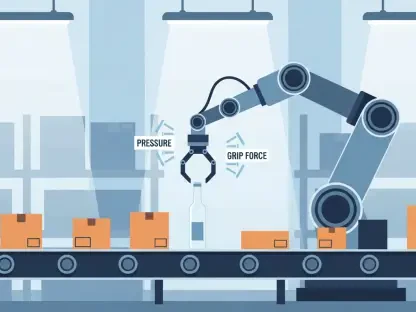Setting the Stage: A Sustainability Revolution in UK Retail Logistics
In the bustling landscape of UK retail and e-commerce, a staggering 88% of senior leaders from major companies believe warehouse automation holds the key to a greener, more efficient future, highlighting a pivotal shift in the industry. Environmental responsibility is no longer just an ideal but a pressing business imperative as consumer expectations for rapid delivery collide with stringent environmental regulations. The adoption of robotics and automation emerges as a critical strategy. This market analysis delves into how these technologies are reshaping warehousing, driving sustainability, and enhancing operational performance. The focus is on current trends, data-driven insights, and projections that highlight automation’s transformative potential in the UK retail sector.
Diving Deep: Market Trends and Data in Warehouse Automation
Current Landscape: Automation as a Sustainability Driver
The UK retail logistics market is witnessing a profound transformation, with automation at the forefront of sustainability efforts. A comprehensive survey of 250 senior leaders from companies with turnovers exceeding £10 million reveals that a vast majority see robotics as essential for reducing environmental impact. Key benefits cited include enhanced energy efficiency through optimized systems, significant cuts in material waste via precise inventory control, and lowered transport emissions by refining delivery logistics. This consensus reflects a market trend where green operations are becoming a competitive differentiator, pushing companies to integrate smart technologies into their supply chains.
Operational Impact: Balancing Efficiency with Customer Demands
Beyond environmental gains, automation is redefining operational efficiency in the retail sector. Data indicates that 87% of industry leaders view these technologies as vital for improving customer fulfillment, with faster order processing and accurate stock management directly enhancing service quality. This dual advantage—sustainability paired with performance—positions automation as a cornerstone of modern logistics strategies. However, barriers such as limited warehouse space, noted by 24% of respondents, highlight the need for innovative solutions to accommodate demand surges without compromising efficiency or green goals.
Adoption Variations: Insights Across Business Models
Market analysis reveals distinct adoption patterns across different retail segments, underscoring the necessity for tailored automation strategies. Omnichannel retailers, juggling both online and in-store demands, show the highest enthusiasm for technology integration, often prioritizing it to ensure seamless operations. In contrast, pure e-commerce players emphasize scalability and speed, while traditional store-only businesses exhibit more caution, reflecting lower immediate needs for complex systems. This segmentation suggests that the market for automation solutions must offer flexible, customized approaches to meet diverse operational priorities and sustainability targets.
Future Projections: Emerging Technologies Shaping Logistics
Innovation on the Horizon: AI and Beyond
Looking ahead, the UK logistics market is poised for a technological leap, with Artificial Intelligence (AI) and machine learning identified as transformative forces by 62% of surveyed leaders. Projections for the next few years, from 2025 to 2030, anticipate that these tools will dominate warehouse optimization, enabling predictive analytics for inventory and demand forecasting. Other innovations, such as advanced sensors (40%), blockchain for supply chain transparency (36%), and collaborative robots (35%), are also expected to gain traction, signaling a multifaceted evolution in how goods are stored, managed, and delivered.
Niche Trends: Exploring Drones and Magnetic Propulsion
Emerging technologies like drone deliveries, supported by 27% of leaders, point to a future where last-mile logistics could drastically cut carbon footprints, though regulatory hurdles remain a concern. Additionally, 25% of respondents highlight magnetic propulsion as a promising trend in fixed automation, potentially revolutionizing material handling with energy-efficient systems. These niche innovations, while not yet mainstream, indicate a market readiness to experiment with cutting-edge solutions, provided economic justification and regulatory frameworks align with industry ambitions.
Market Challenges: Navigating Barriers to Adoption
Despite the optimism, the market faces significant challenges in scaling automation. High initial costs and integration complexities are recurring themes, with many leaders cautioning against fragmented implementations that fail to deliver expected returns. Economic pressures to justify tech investments, alongside potential regulatory shifts around data privacy and drone usage, could slow adoption rates in the near term. Addressing these barriers will be crucial for the market to realize the full potential of automation as a driver of both sustainability and profitability in UK retail logistics.
Reflecting on the Path Forward: Strategic Takeaways from 2025 Insights
Looking back at the analysis conducted in 2025, the overwhelming support for warehouse automation among UK retail leaders painted a clear picture of an industry in transition. The data underscored a remarkable alignment on the technology’s role in slashing emissions, minimizing waste, and boosting customer satisfaction. Challenges such as spatial constraints and investment costs were acknowledged as hurdles that demanded attention. Moving forward, the industry was encouraged to adopt strategic, integrated approaches, starting with pilot programs to test automation in controlled environments. Emphasis was placed on leveraging AI and machine learning for competitive advantage, while exploring partnerships to mitigate financial risks. These steps were seen as vital for transforming warehouses into hubs of sustainable innovation, ensuring UK retail could meet evolving environmental and consumer demands with confidence.









